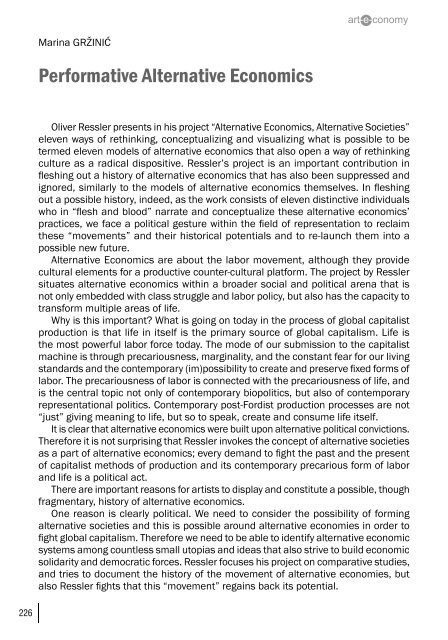art-e-conomy _ reader - marko stamenkovic
art-e-conomy _ reader - marko stamenkovic
art-e-conomy _ reader - marko stamenkovic
Create successful ePaper yourself
Turn your PDF publications into a flip-book with our unique Google optimized e-Paper software.
226<br />
Marina GRŽINIĆ<br />
Performative Alternative Economics<br />
Oliver Ressler presents in his project “Alternative Economics, Alternative Societies”<br />
eleven ways of rethinking, conceptualizing and visualizing what is possible to be<br />
termed eleven models of alternative economics that also open a way of rethinking<br />
culture as a radical dispositive. Ressler’s project is an important contribution in<br />
fleshing out a history of alternative economics that has also been suppressed and<br />
ignored, similarly to the models of alternative economics themselves. In fleshing<br />
out a possible history, indeed, as the work consists of eleven distinctive individuals<br />
who in “flesh and blood” narrate and conceptualize these alternative economics’<br />
practices, we face a political gesture within the field of representation to reclaim<br />
these “movements” and their historical potentials and to re-launch them into a<br />
possible new future.<br />
Alternative Economics are about the labor movement, although they provide<br />
cultural elements for a productive counter-cultural platform. The project by Ressler<br />
situates alternative economics within a broader social and political arena that is<br />
not only embedded with class struggle and labor policy, but also has the capacity to<br />
transform multiple areas of life.<br />
Why is this important? What is going on today in the process of global capitalist<br />
production is that life in itself is the primary source of global capitalism. Life is<br />
the most powerful labor force today. The mode of our submission to the capitalist<br />
machine is through precariousness, marginality, and the constant fear for our living<br />
standards and the contemporary (im)possibility to create and preserve fixed forms of<br />
labor. The precariousness of labor is connected with the precariousness of life, and<br />
is the central topic not only of contemporary biopolitics, but also of contemporary<br />
representational politics. Contemporary post-Fordist production processes are not<br />
“just” giving meaning to life, but so to speak, create and consume life itself.<br />
It is clear that alternative economics were built upon alternative political convictions.<br />
Therefore it is not surprising that Ressler invokes the concept of alternative societies<br />
as a p<strong>art</strong> of alternative economics; every demand to fight the past and the present<br />
of capitalist methods of production and its contemporary precarious form of labor<br />
and life is a political act.<br />
There are important reasons for <strong>art</strong>ists to display and constitute a possible, though<br />
fragmentary, history of alternative economics.<br />
One reason is clearly political. We need to consider the possibility of forming<br />
alternative societies and this is possible around alternative economies in order to<br />
fight global capitalism. Therefore we need to be able to identify alternative economic<br />
systems among countless small utopias and ideas that also strive to build economic<br />
solidarity and democratic forces. Ressler focuses his project on comparative studies,<br />
and tries to document the history of the movement of alternative economies, but<br />
also Ressler fights that this “movement” regains back its potential.


